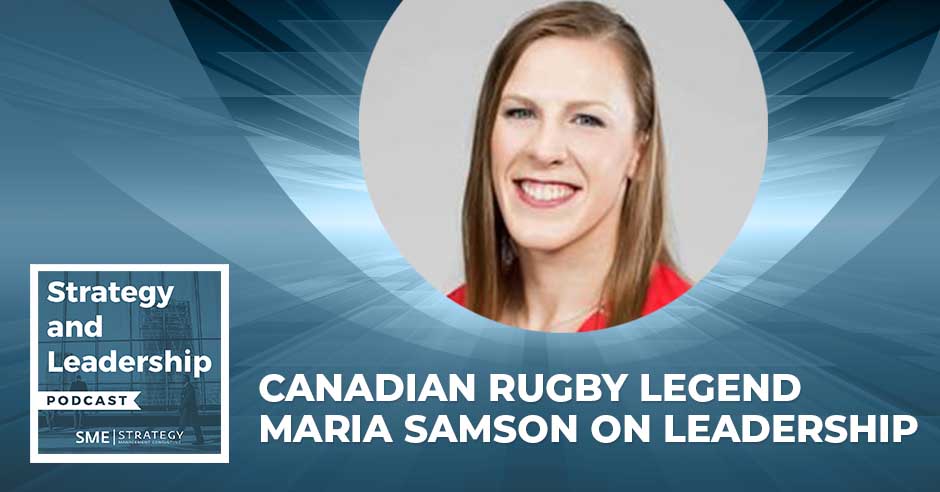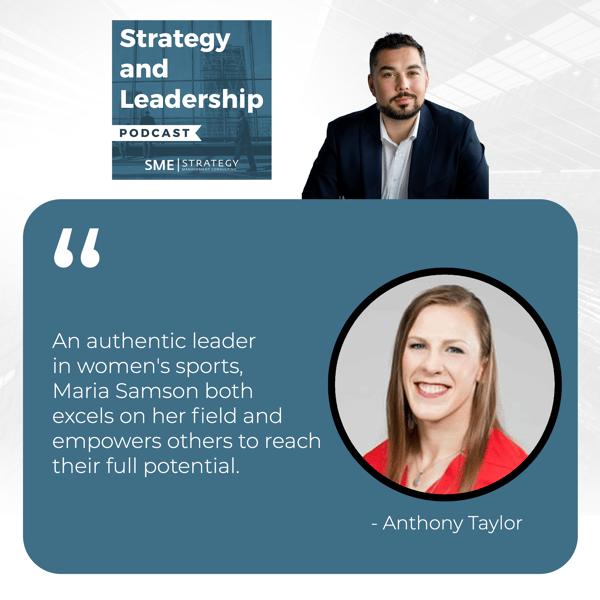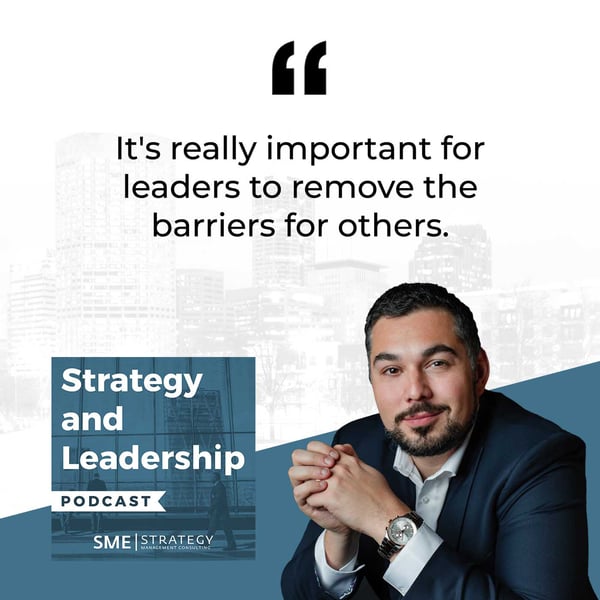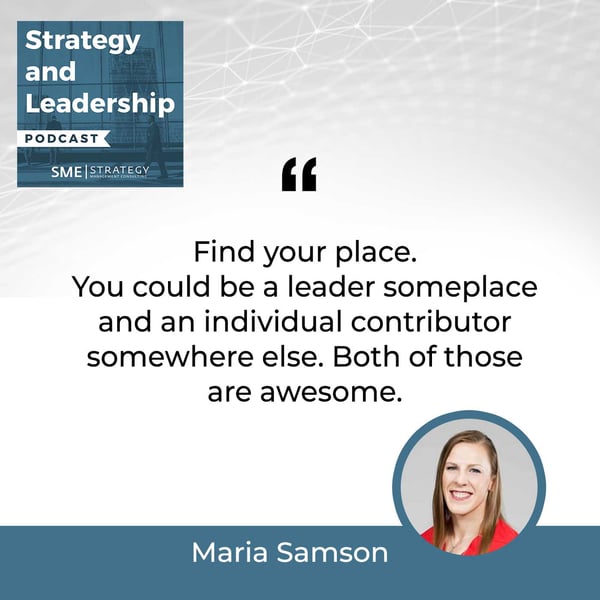
Certain situations will call us forth into leadership. Whether that's in sports, business, or life, we need to be ready for when that time comes. In this episode, Anthony Taylor engages in an insightful conversation with Maria Samson, a distinguished leader in women's rugby. Maria shares her remarkable journey ad her experiences in advocating for women in sports, breaking down barriers, and fostering equitable contributions. The discussion touches upon her leadership roles, both on and off the field, emphasizing the importance of vulnerability, trust, and open communication in building powerful teams. Maria's story serves as an inspiration for aspiring leaders, highlighting the transformative impact of sports on leadership development and the ongoing strides in promoting women in rugby and beyond. Tune in and learn from this exceptional leader!
Listen on Spotify: https://open.spotify.com/episode/0fT54DACGjOaAnLHfGoizH?si=gaP441XJRAK4gMOD5PY2jA
Listen on Apple Podcasts: https://podcasts.apple.com/ca/podcast/canadian-rugby-legend-maria-samson-on-leadership/id1202449526?i=1000644200526
Want to continue the conversation with other leaders around the world? Join our Strategy and Leadership community. https://strategy-and-leadership.mn.co
► Subscribe to our channel for weekly videos on strategy & leadership: https://www.youtube.com/channel/UCOHLNRrpk3rGUdg7qUQjiog/?sub_confirmation=1
➡ Looking for a sample agenda for your strategic planning offsite? https://www.smestrategy.net/blog/sample-strategic-planning-agenda
// Connect with us:
► Contact us: https://www.smestrategy.net/contact
► Connect with Anthony on LinkedIn: https://www.linkedin.com/in/anthonyctaylor604
// About SME STRATEGY CONSULTING:
SME Strategy is a management consulting firm that specializes in helping organizations develop and implement their strategic plans. We work with teams to facilitate conversations about strategic direction and business strategy so that our clients can focus their energy on what will move them forward faster.
► Work with us: Are you looking for someone to facilitate your strategic planning process? https://www.smestrategy.net/strategic-planning-facilitator
► Check out our Strategy & Leadership Podcast: https://open.spotify.com/show/4yND4JKofh64gcvyvcLMqW
► Check out our online course on how to successfully lead your next strategic planning process: https://courses.smestrategy.net
---
Watch the episode here
Listen to the podcast here
Canadian Rugby Legend Maria Samson On Leadership
In this episode, my guest is Maria Samson. I'm going to try to capture her bio as best as possible. Maria has represented Canada 21 times internationally as a member of the Canadian National Women's Rugby Team. She was named Rugby Canada's Player of the Year in 2012. She's an active board member in the Capgemini Women in Rugby Leadership Program. She's also involved in other organizations in rugby. She has an amazing career in professional sports, leadership, and in the men's and women's sides. That's most of it. Maria, how are you?
I am doing great. How are you doing?
I'm fantastic. I'm stoked to chat with you. Women in sports are much deserved and anticipated, if you get what I mean by that, in long overdue presence in media and the world. I'm excited to hear about your journey before it was cool, what that's been like for you, and then your experience as a leader. Before we do that, why don't you tell our audience a little bit about you? Is there anything that I missed either personally or professionally?
Thank you. I’m super happy to be here. Briefly, I grew up in Montreal. You've mentioned rugby a lot of times. Rugby wasn't my first love. I played five years of American football on our boys' high school team, as well as basketball. I played two years of semi-pro football in Montreal for the Montreal Blitz once I was a little bit older and played a year of university basketball at the University of Windsor.
Rugby came to life more through university. I played a couple of years of university at McGill so that Windsor piece was a little bit of an exchange. I have an Engineering degree from McGill. It took me on a journey with rugby about loving the sport. When I went on my engineering coops, I played rugby and had 30 guy and gal friends immediately in Windsor, Ontario, and Fort McMurray.

I ended up meeting my husband here in Calgary. Eventually, I moved to Calgary to settle down with the boy I met, Mozak. I started taking rugby seriously. I was having a lot of fun playing rugby in the summer club scene. I was like, “I think I’m good at this.” Everything took off around the 2009-2010 mark and got lucky to start my national team career in 2011.
We have readers from all over the world. If you're not Canadian, engineering at McGill is no joke either. There are lots of skills there. It’s a very cool background. Let's talk about your leadership journey. It wasn't intentionally rugby. You've grown through sport. I could ask you about leadership lessons in sports but you're also involved in a lot of organizations supporting sports. Maybe I'll start there. What's it like working on boards? How's your experience been there? Are you enjoying it? Did you not enjoy it? What are some lessons learned for running those types of organizations or leading organizations that you could share with our audience?
I would say I've been lucky throughout all the experiences I have eventually gotten this opportunity with Capgemini and World Rugby for their Women in Rugby Leadership Scholarship. When I think back on what led me to this point, I've always been this person who fights for the little guy. It's a quote saying and so when people ask me, “Why do you advocate? Why do you push for certain things,” it transitioned to this self-serving piece where it was women's sports, women in rugby specifically.
My first board experience was with AthletesCAN, which is an organization that represents every national team athlete across the country. We were advocating to governments and helping athletes advocate to their national sports organizations. That's where the bug hit me. I can affect change for others in sports. We shouldn't have these Olympic stories every two years where somebody inspires somebody to change their life through their Olympic story. We have those stories every single day in sports across the world. That's where that came from.
Every two years, somebody inspires somebody to change their life through their Olympic story.
As I got on the national team with rugby, it was more like the rugby side. Rugby was a male-dominated sport and the funding was going to the men's side, the advertising money, marketing opportunities, and sponsorship. I was so lucky with the energy that I had when I came onto the board in 2017. There were other people in the room who thought like I did with respect to equitable contributions to women's sport and women's rugby in particular. We did a whole bunch of probably boring governance changes, getting more women on the board, and making sure that our women no longer had to pay to play.
In my entire career, except for the World Cup, you wrote a check to go on tour. With the amount of global energy that has gone behind women in sport, particularly women in rugby with World Rugby, they've done a whole women's rugby strap pram with the engagement of Capgemini into the scholarship program in 2022. It shows the power of women's sports and the energy behind women's sports. We're on a massive trajectory that's going to never hit the ceiling kind of thing. We're going to continue to break the glass ceiling when it comes to that type of stuff.
There are so many things that I take from here. One of them was because of that little guy mentality, for lack of a better word, what would drive you is you're like, “How can I advocate for what's right and what's important to me?” What I hear cool about that is you found opportunities to participate in programs like the one put on by Capgemini and I'm sure dozens of others but also looking for opportunities to support others. Through that, it led you into other board positions that you've parlayed into other boards.
From that, using the position of hose are awesomepower, you've been able to then put structural changes in place because you had a guiding coalition of people that saw that same vision. The benefit of being on a board or contributing at any kind of governance level is that you can make those changes. I find it's important for leaders, whether it's in a board or a senior management position to remove the barriers for others. You were that person back in the day. You played there and lived it.

That experience allowed you to contribute and understand, “If I was in that position, what would make such a big difference for me? How can I make those things happen?” It sounded like in doing that, you've been able to lead that transformation. My question is, what was that going in and being a woman on a primarily male-dominated board, which is the case in a lot of boardrooms? I don't have a statistic. How did you manage that? What were some challenging things? What are some of the successes that you want to celebrate? What are some pieces of advice you might give to other leaders or women leaders who are in a similar position?
For me, it’s humility in the sense that I was going to take risks and make mistakes, and that was going to be okay. That comes from my sporting background, being able to go on the field, make mistakes, and then improve. You can't dwell on your mistakes or take no risks. It'd be a boring game to watch. My mentality going into the boardroom was I was going to take a lot of risks and come in swinging.
You can't dwell on your mistakes. You can't take no risks. Go on the field, make mistakes, and then improve.
I got more and more refined over that first year, especially on the Rugby Canada board and the AthletesCAN board. We are a whole bunch of athletes. We probably had similar mindsets and ways of operating. When it came to the Rugby Canada boardroom, it’s incredibly smart people in the room who had been on business boards. That was my first experience being, let's say, in a business boardroom. Decorum, Robert’s Rules, where you sit, and motions.
It was scary but where I got lucky is I had good mentors who took me under their wing and have you thought about this. It was probably a question that I heard multiple times almost before every meeting or in the meeting. That's something that I try to do from a leadership perspective. Instead of trying to sway somebody by saying, “What about this,” I say, “Have you thought of this?” That can lead the direction.
Shout-out to a few people, Sally Dennis, Kathy Henderson, Pat Parfrey, and Luke Campbell. Those individuals in the Rugby Canada boardroom took me under their wings. I was able to blossom. The risk-taking part looking back on it was like, “That was a light bulb moment.” Don't be afraid in the boardroom. I don't know. When you think about the worst that can happen, it couldn't have been that bad.
Once I got that advice and mentorship, I pushed for change, understood the way a boardroom works, and influenced change before I even got there. Who are your advocates in the room? Who are you going to need help to convince? That's the same thing when you come to a meeting place. When you have a bright idea and you're trying to get approval for some big project, you want to know where everybody sits before you get into the room. It might be a ten-person approval. You want to know where the majority of those people sit. That was helpful.
I was lucky that I had those advocates in the room for women. It's not only women's sports and women's rugby but women's leadership. It's not solely about women's sports but being a role model for another young girl perhaps who wants to do something in the sports industry from a leadership perspective, not necessarily even on the field. You can't be what you can't see. A lot of my stuff is done on the men's rugby side but I'm a strong female role model for young men who maybe have a different perception of women. That can be very powerful on that stream as well.
What was it like as a player? You talked about women and leadership. You talked about not understanding your role but figuring out your role. You also talked about growing and developing into that space. You take a bunch of risks and learn over time. What was it like as a player for you entering the highest level of competition and your evolution as a player? How did your role on those teams change over your career?
It’s finding your place. One interesting thing about teams is there's a captain, usually 1 or 2 captains, and then the rest is not well-defined. You think of the workplace and a manager, supervisor, and team lead. The hierarchy perhaps is better defined. On a sports team, especially as it rotates and in and out of selection, you're finding your place in every single selection, camp tour, or game. That is probably a huge learning that is able to transfer into the workplace around finding your place.
You could be a leader and influencer someplace. Somewhere else, you could be an individual contributor. Both of those are awesome. Being an individual contributor or a leader has its values. I have those breadths of experience across many different teams. I was never the captain of the national team but I found my place being an individual contributor and kick ass at that.

There’s something I find so interesting and I play a lot of sports myself. I've never played at the highest level that you have but because of the nature of international competition, it's always a new team. The nature of it is you're always finding your roles and having to create new norms, rebalance, and work together. It requires a high level of trust and communication.
The successful teams, I believe, are able to move through that form and storming, norming quickly but then running the parallel between a board is if you've got good governance, there's good turnover and more new people are coming in but your ability to be successful in a board relies on the same things. You need to be able to trust the people around you, communicate, work through conflict, and have the same mission and purpose. Would you agree that those two things run in parallel?
A thousand percent. When you think of sporting backgrounds, there's this cool LinkedIn series by Ryan Smyth that's going on. It’s what he learned when he was a national team player with the rugby team. You think of conflict resolution, change management, risk assessments, strat planning, contract negotiations, marketing, and forecasting.
You do all of those things as an athlete. To get in the boardroom and do that was cool for me. In my real daytime job, I've had tons of opportunities to do all those things. I truly believe that my sporting background immensely helped me there. It's a huge amount. Sometimes it's hard to transfer. When you think of yourself, you're like, “I was just an athlete.” That's what's so powerful too about the Capgemini Women in Rugby Program. It's bringing all those things to the forefront and giving you mentors and coaches.
The Capgemini university programs have a whole bunch of learning tools. A lot of those skills are hiding under the surface. Bringing them to the forefront and putting a little bit more refinement on your delivery is what's more powerful about this program. The twelve scholars in that program are leaders but it's truly about bringing us to the next level and being global influencers. Even though the words coming out of my mouth are, “How can that be me,” that's truly the power of the program.
I want to say something about sports. I believe sports is a great development opportunity for all kids. You learn so many skills. The thing that stands with me when I hire people or work with people is the fact they have a sporting background has that winning mentality. Winners want to be around winners. It’s having that culture of understanding.
There's this leadership clip I play to people all the time of Joel Embiid, who is a basketball player, getting yelled at by one of the senior guys on his team but he doesn't react to it because he recognizes that this person in senior leadership or that experience is telling one of the star players, “Communicating in uncertain words, you have to step it up.”
Understanding among athletes is like, “We're on the same goal. Sometimes we might blow up at each other in an ineffective way.” A lot of the time, we get it. That trust is there. One of the things I've got to participate in is the Young Leaders of the Americas Initiative. I met a lady named Shannon Ferguson, who's the CEO of FanSaves. She works in sports across Canada doing amazing things.
I was like, “I'll give her a shout-out.” Shannon, you're doing great and cool stuff in sports. Shout-out to you and women in sports. That's cool. Check out FanSaves. They're not sponsoring the show but she's awesome and doing cool things. What I want to highlight is when you put yourself in these environments to be put with random people toward a common mission, anything is possible.
You have your doubts like, “All of these people are great.” You then realize, “Wait. I'm great. That's why I'm here.” The opportunity to develop your greatness is cool. Maria, that's one of the reasons I was stoked to chat with you. You're doing great things in your community, the community of sport, and work. Kudos to you for that. As we finish up here, is there anything you want to say about leadership collaboration teams?
I started a little bit with that in terms of failure and being okay with taking risks and failing. Vulnerability in general is the most incredible trait that somebody can have. It’s opening up about things that are a struggle, saying that you need help, whether it comes to something at work or home. To me, that is a truly powerful team message that you can have, whether it's on the field or in a business meeting here at work.
Be okay with taking rests and failing.
When I think of team scenarios, the rugby team that I coached, the Mount Royal University Men's Rugby Team, we shake hands every practice. It’s 50 guys you shake hands every single practice because you're opening the door. You can tell by somebody's body language if their shake is like it’s not as great as it has been in the past. You could check in with them later.
It’s the same thing here at work. When we have meetings, we do a twenty-second check-in. You can share anything you want. It can be good or bad. You can see patterns in people. If somebody shares something that maybe is not so great, it's a good opportunity to check in with them later. You can get the energy of the team from people and myself being vulnerable. That opens up that trust scenario and knowing that you're working towards a common goal. To me, that is powerful.
That's a great way to finish this episode. Maria, where can people learn more about you and the work you're doing?
I'm not a huge social media buff but I do have a Twitter and Instagram, @MariaSamson5. That's the real thing I'm supposed to say. It's too common. On LinkedIn, I’m Maria Samson. Find me there.
Maria, thank you for being here. It's been a blast chatting with you. Thanks for being open and sharing some amazing leadership insights.
Thank you so much, Anthony.
One of the things that I'm left with as we finish is you don't have to be on social media to make a difference. Just get in and do the work. Folks reading, I want to encourage you. There are so many opportunities to develop in your leadership. It's not necessarily within the four walls of your work but there are so many great organizations that need great leaders, whether that's volunteers, on the board, or community sports through coaches. That's one of the things I'm taking away.
The other is there are micro opportunities to check in with your team to see where they're at, whether that's a handshake before and after the game or a poll check before or after a meeting. Your team's ability to trust each other and show each other respect is the determinant of how successful you will be in your organization and mission. I invite everybody. Who are you advocating for? Who are you fighting for? You don't exactly know where it's going to end up but if you start and get together with a bunch of people with a common mission, there's a lot of great upside and potential for that. Maria, thank you again for sharing all of that with us. It was a blast. I appreciate you being on the show.
Thank you so much.
Be sure to subscribe. If you haven't yet, share this with a friend who's developing in their leadership. Post it on your social media so we can share more that you don't need to be on social media to be cool. The irony, I guess. Thank you, Maria Samson, my guest. I'll see you next time.
Important Links
- Maria Samson - Instagram
- FanSaves
- Twitter - Maria Samson
- Maria Samson - LinkedIn
About Maria Samson
 Canadian rugby legend Maria Samson is a proven leader, no matter the arena. With the increased focus on women in sports, I wanted to see if you would be interested in speaking with her about the lessons she’s learned from sports and how it applies to business leaders.
Canadian rugby legend Maria Samson is a proven leader, no matter the arena. With the increased focus on women in sports, I wanted to see if you would be interested in speaking with her about the lessons she’s learned from sports and how it applies to business leaders.
Maria represented Canada 21 times internationally as a member of the Canadian National Women’s Rugby team and was named Rugby Canada’s Player of the Year in 2012. In 2014, she helped lead the team that brought home a silver medal from the Women’s Rugby World Cup.
Maria is also a passionate sports advocate, helping ensure equal opportunities for women’s programming. She is also an active board member of Capgemini’s Women in Rugby Leadership Program, working to transform the future of women’s sports.
Maria speaks about:- Diversity, equity, and inclusion on the pitch and in the workplace.
- The power of vulnerability and how to effectively connect with younger team members.
- Leveraging the power of emerging technologies for performance analytics and feedback.
- Maria will be participating in this week’s Women in Rugby Leadership Summit, hosted by World Rugby and Capgemini. Capgemini is a global partner of World Rugby’s Women in Rugby program, supporting the Capgemini Women in Rugby Leadership Program.


